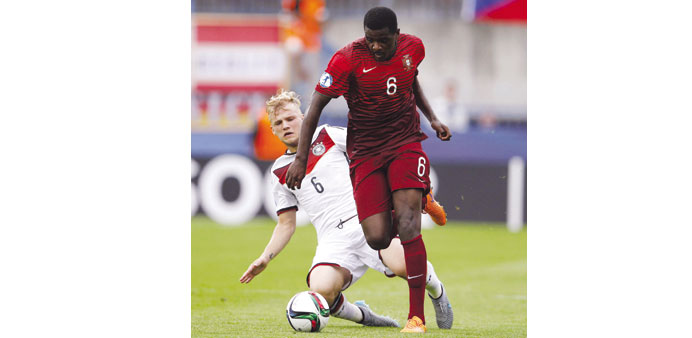Portugal’s William Carvalho (right) gets past Germany’s Johannes Geis during the European Under-21 Championship semi-final in Olomouc, Czech Republic. Portugal won 5-0. (Reuters)
By John Ashdown in Olomouc/The Guardian
There was a moment – well, in fact there were several but one stood out – at the Andruv Stadium on Saturday night that summed up William Carvalho’s utter dominance over the Germany midfield in Portugal’s 5-0 humiliation of the favourites.
The ball broke loose in the middle of the Portugal half. Two German players converged on it but in a couple of strides the Sporting player had beaten both to the punch. A laconic shimmy later and the two players in white were on the turf, their tackles having swiped at thin air, and Portugal were away on another counterattack.
In an Under-21 European Championship where team performances have caught the eye more than solo efforts, Carvalho and his teammate Bernardo Silva, the two tips of Portugal’s midfield diamond, have been the outstanding individuals. Any notional team of the tournament nominated after tomorrow’s final will have to be set up in the exact formation Rui Jorge uses for his side. To do otherwise would be to underplay the impact of the pair.
Horst Hrubesch looked to combat them by playing the two men he had posted in defensive midfield in a 4-2-3-1 in the group stages – Emre Can and the Bayern Munich-bound Joshua Kimmich – as the advanced central pair in a 4-1-4-1 but that simply served to offer Carvalho greater scope for his skills. The Germany coach returned to his tried-and-trusted formation in the second half, to no avail.
Can, in particular, had a chastening match. The Liverpool player had enjoyed a decent tournament in midfield but there was a gulf in quality between him and Carvalho.
At this level Can has great presence – he is physically a step or two ahead of many in the age group – but it paled beside that of his Portugal counterpart, whose influence is such that he seems to have his own gravity, the whole game shaped and curved by its pull.
Arsenal and Manchester United were linked with Carvalho last summer when he was called up into Portugal’s squad for the World Cup in Brazil. Miguel Veloso, João Moutinho and Raul Meireles initially kept him out of the team but he did start the final group game against Ghana, a match that turned out to be Portugal’s only win at the tournament.
e made no secret at the time of his desire to play in England or Spain but his £37m release clause was enough to put off any suitors. The evidence of this tournament so far suggests it would be something of a bargain.
Arsenal and United requested scouting tickets for this tournament, but they were hardly alone – Bournemouth, Aston Villa, Bolton, Brentford, Brighton, Burnley, Charlton, Crystal Palace, Everton, Fulham, Liverpool, Manchester City, Middlesbrough, Reading, Southampton, Stoke, Sunderland, Swansea, Tottenham, Watford, West Ham and Wolves all made similar requests, not to mention Milan, Ajax, Dortmund, Atlético Madrid, Internazionale, Barcelona, Bayern Munich, Juventus, Paris Saint-Germain and many of Europe’s other biggest clubs.
They cannot fail to have been impressed. Carvalho, who in the group stages covered more ground than any other player despite seeming rarely to be forced out of anything other than a jog, eclipsed not only Can and Kimmich in Olomouc but also Johannes Geis who had come into the tournament with a growing reputation and Max Meyer, Geis’s half-time replacement.
Pierre Hojbjerg, expected to be part of Pep Guardiola’s first-team squad at Bayern next season, failed dismally to impose himself on the game in Denmark’s semi-final defeat to Sweden. There has been one outstanding midfielder in this tournament and that is the Portugal No 6.
The 23-year-old’s only rival for player of the tournament is his team-mate. After finding his opportunities at Benfica limited, Bernardo Silva went against the general flow of traffic away from Monaco by moving to the Stade Louis II for €15.75m in January.
While Carvalho provides elegant, effortless control – he has played more passes than anyone else in the tournament – Silva specialises in scurry and surge. Portugal’s nominal front two play almost as wingers meaning the No10 is in essence the central attacking pivot.
When he was replaced five minutes after half-time with Portugal four goals to the good, there was a standing ovation from a largely neutral Czech crowd.
The change meant a switch closer to a 4-4-2 for Jorge’s side and offered Carvalho a chance to show his versatility – one charge down the right channel particularly caught the eye and just after the hour he ambled forward on to another loose ball, taking three touches before firing off his shot just over the bar, where others would have simply smashed straight for goal.
If Portugal do go on to win the Under-21 European title for the first time they will owe much to the man from Sporting. Regardless of the result, though, Europe’s top clubs have been given plenty of food for thought.

